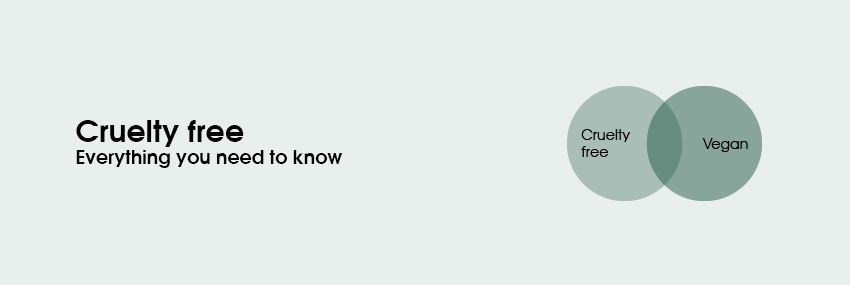Do you buy cruelty free cosmetics? Are you worried about skincare brands testing their beauty products in animals? Many skincare manufacturers claim that they do not test their cosmetics in animals, so we’ll see the truth in all this so that you can buy cosmetics ethically, knowing how to shop according to your values.
Hello! Today I am going to talk about a topic that you have asked me a lot about and that I really wanted to talk about: cruelty free cosmetics. It is a difficult subject to cover, since it must be taken into account that the regulations on animal experimentation are not the same in Europe, the United States and China (the three major markets). In addition, the lack of regulation of certain aspects allows there to be gray areas from which companies can benefit. Do you want to solve all your doubts about cruelty free cosmetics? Keep reading!
In this post you will find the following points:
- What are cruelty free cosmetics?
- What are the regulations for cruelty free cosmetics?
- Are the ingredients in cosmetics cruelty free?
- Are the cosmetics I buy really cruelty free?
1. WHAT ARE CRUELTY FREE COSMETICS?
When we talk about cruelty free products we mean all those that have not been tested on animals. Today we can find all kinds of cruelty free products, but we are going to focus on cosmetics and everything around them. The idea behind cruelty free products is to replace animal testing with other tests that do not require the participation of animals. There are more and more advanced ways of verifying that a product is safe for us to use on our skin, so, in principle, the idea of leaving animal testing aside is very promising.
Although today there are several organizations that verify that the different products we buy are indeed cruelty free (PETA and Cruelty Free International are two of the best known), there is no single registry or an administration in charge of carrying out these checks. Normally, when one of these companies analyzes the products of a manufacturer, it can then use one of the quality seals that we usually see (known as the leaping bunny or cruelty free bunny). However, many cosmetic manufacturers use their own cruelty free logos, without any third-party verification. This is controversial, as it is as if these manufacturers pat themselves on the back for being ethical and looking after animal rights, making it easy to take advantage of the situation and use it to get the most out of it.
2. WHAT ARE THE REGULATIONS FOR CRUELTY FREE PRODUCTS?
As I mentioned at the beginning of the post, there isn’t an unique, worldwide regulation about animal experimentation for cosmetics, so we have to attend to the one that is applicable in our country. In this case I am going to focus on the three most important markets: Europe, the United States and China, since most cosmetics are manufactured in these places.
The European regulations on cruelty free cosmetics are included in Chapter V of Regulation (EC) 1223/2009 of the European Parliament and of the Council of November 30, 2009, which came fully into force in 2013. Article 18 includes the prohibition of the introduction on the market of cosmetics that have been subjected to animal experimentation (either in relation to their ingredients, their combinations of ingredients or the final formulation). In addition, animal testing for cosmetic products is also prohibited. This Regulation also contemplates the possibility of establishing justified exceptions for certain ingredients for general use and that cannot be substituted by others or for cases in which there is no alternative to animal testing.
In the United States, there isn’t an unique regulation for animal testing for cosmetics. In several cases, bills have been presented (such as the current Humane Cosmetics Act) trying to establish a national regulation, but so far none of them have been approved. Instead of creating a single standard, there are some states that have regulated the matter, prohibiting animal testing, like the cases of California or Illinois.
The case of China is a little peculiar. Until 2019, it was mandatory for any company that wanted to import its products there to test them on animals (somewhat contradictory, since those made in China did not have to do so). However, the use of alternative tests was recently approved in the Administrative Measures for the Filing of Non-Special Use Cosmetics. Thus, until 2019, companies that sold their products in China could not be considered cruelty free, since that market required testing on animals. Today, by allowing other forms of animal-free experimentation, the situation has changed, which means that a company that sells in China no longer has to consider itself cruelty free.
As you can see, there is currently a major trend towards restricting animal testing and replacing it with other types of testing. Although it is very good news, there is still a long way to go.
3. ARE THE INGREDIENTS IN COSMETICS CRUELTY FREE?
As I mentioned in the previous section, both in the European Union and in certain parts of the United States, animal experimentation with ingredients intended for cosmetic purposes has been prohibited. However, this does not mean that all ingredients in products that claim to be cruelty free are cruelty free, too. To understand this, several aspects must be considered.
On the one hand, we must bear in mind that there are ingredients that have been used in cosmetics for many years. This implies that, although these ingredients are not experimented on in animals today, it is possible that when they were first considered for cosmetic purposes, they were tested on animals. In this case, it would be necessary to consider whether, having experimented years ago, we should consider these ingredients as cruelty free. In addition, since there are certain markets where animal testing has not been prohibited, they may have been tested on animals prior to incorporating the products into other countries where such testing is not permitted.
Another important aspect is that currently (in the European Union) experimentation on animals of ingredients, combinations of ingredients and final formulations for cosmetic purposes has been prohibited (and this part is what I want to highlight). More and more new ingredients are emerging in cosmetics, but although they may not been tested on animals for cosmetic uses, it is possible that these experiments have been done to use the ingredients for other purposes (for example, pharmacological ones). Therefore, these ingredients could not be considered cruelty free (although they have not been tested on animals for use as cosmetics).
The last consideration regarding if the ingredients of the cosmetics we use are really cruelty free parts from how these ingredients are obtained. Today, when a manufacturer needs to buy ingredients for their products, they can turn to many suppliers. There are certain ingredients that can be of animal or vegetable origin, so the manufacturer must ensure that the ingredient that it buys from its suppliers has been obtained without animal suffering. In this case, the integrity of the suppliers and the manufacturer itself will be the key to considering that the product is, indeed, cruelty free, so you should consult the brand directly to find out the conditions and guarantees that they require when purchasing their ingredients.
4. ARE THE COSMETICS I BUY REALLY CRUELTY FREE?
This question does not have a simple answer, as you have been able to verify. The most reliable source to ensure that the products you buy are really cruelty free will be their own manufacturer, who must take all necessary measures to find out that all the conditions are in place to consider their products as cruelty free.
Earlier I talked about logos stating that products are cruelty free. If you look at the products you have at home you will see that there are many and that some companies even use their own. As there is no specific regulation for this type of product, it is easy for a company to put a logo on its website and its products saying that they are cruelty free just to get more sales. It is unethical, but there is nothing preventing them from doing it.
It should also be borne in mind that, as I mentioned before, animal testing for the production of cosmetics was banned years ago in the European Union. This implies that all products manufactured and marketed in the European Union should be cruelty free. And if all the products sold here are cruelty free, what is the point of including a logo that indicates that certain products are cruelty free? Isn’t it simple marketing to differentiate yourself from other brands? At the end of the day, when a brand X claims that it does not experiment on animals, they make us consumers believe that other brands do (despite the fact that, as I have mentioned, none of them experiment on animals).
Finally, I want to mention a topic that I will talk about in more detail in another post: are cruelty free cosmetics vegan? Not necessarily. Although we usually find that the same products that are advertised as cruelty free are also vegan, we can find cruelty free products that are not vegan and vice versa.
As you can see, it is not easy to know if cosmetics are really cruelty free, but I hope that with this article you have learned a little more about it. Do you usually buy cruelty free cosmetics? And vegan ones? Let me know in the comments section!
If you liked this post and want to continue learning about beauty, cosmetics and skincare, you will be interested in reading these other articles:
Do you want to learn to take better care of your skin? You can see an index of all my informative posts here.● Follow me on Instagram, Facebook, TikTok and Pinterest.
● Share, comment and like my posts on social media.
● Shop through my links to help me keep up with this blog.

I’m Nacho and I’m passionate about skincare. I really enjoy learning and sharing my knowledge about skincare and I read scientific papers so you don’t have to. I want to break stereotypes because I believe skincare has no gender: skin is skin.


